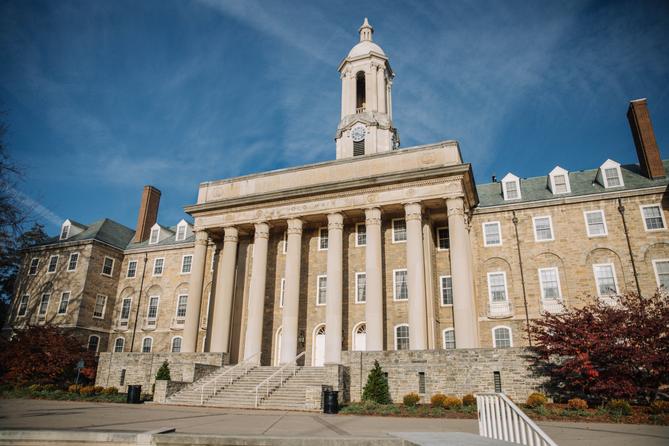Penn State’s Board of Trustees approved the closure of seven campuses Thursday, putting into motion a process that will impact thousands of students and more than 500 employees.
Citing declining enrollments and financial challenges, the university will close the DuBois, Fayette, Mont Alto, New Kensington, Shenango, Wilkes-Barre, and York locations after May 2027.
Ahead of the vote, President Neeli Bendapudi told the board that closing the locations was a strategic and humane decision.
“We are spreading our students, faculty, and staff so thin that we jeopardize the quality of education and the support that we can offer,” Bendapudi said. “We are subsidizing decline at the expense of growth.”
The board passed the president’s closure plan by a vote of 25 to 8.
Trustees Ted Brown, Donald Cairns, Lynn Dietrich, Barry Fenchak, Chris Hoffman, Anthony Lubrano, Jay Paterno, and Nicholas Rowland voted against the measure. The three state secretaries on Penn State’s board — Cynthia Dunn, secretary of the Department of Conservation and Natural Resources; Carrie Rowe, acting secretary of education; and Russell Redding, secretary of agriculture — did not attend the meeting due to a perceived conflict of interest, said board Chair David Kleppinger.
Multiple trustees said this was a difficult, but necessary decision for Penn State’s future.
The move brings some finality to months of uncertainty and consternation among university officials and employees. Under Bendapudi, Penn State made steep budget cuts to its statewide system, centralized leadership and administrative positions, and paid some employees to leave. However, internal documents obtained by Spotlight PA suggest those moves did not stem financial losses at the campuses.
In February, the university began to review closing up to 12 of its 20 statewide campuses. Some faculty bristled at the perceived lack of transparency from the administration about the factors and data informing which locations it chose to review. Initially, Penn State said Bendapudi would decide which campuses to close. Then, in April, the university announced the governing board would approve the closure plan.
Leading up to Thursday’s vote, some trustees challenged Penn State’s reasons and goals for shutting down locations. Hundreds of people signed an open letter to trustees asking them to consider other options for the campuses.
Earlier this month, the Philadelphia Inquirer reported the list of seven campuses the president wanted to close. Spotlight PA obtained nearly 250 pages of internal Penn State records, including the full text of the university’s recommendation and related materials informing the board’s private discussions.
Those records revealed Bendapudi envisions a Penn State that is more regionalized and that maintains the campuses with the largest enrollments, those in areas with growing populations, and ones that generate revenue or are near self-sustaining. The campuses Bendapudi recommended for closure did not meet these criteria. Following Spotlight PA’s story, Penn State publicly shared the recommendation report.
Kleppinger, the board chair, said trustees met privately for nearly four hours in two executive sessions this month to answer dozens of trustee questions on Bendapudi’s plan. Transparency advocates have questioned the board’s use of executive sessions to restrict public access to those gatherings. Melissa Melewsky — media counsel for the Pennsylvania NewsMedia Association, of which Spotlight PA is a member — said that closing campuses was “the exact type of discussion that should be happening amongst the board at a public meeting.” A former university trustee wrote in StateCollege.com this week that someone living locally should take legal action against the board for one of its private gatherings.
Thursday afternoon was the first time trustees discussed the topic at a public meeting. For more than an hour, some trustees applauded the university for taking action on the topic, while others voiced concern with how the closure plan would be implemented or whether the administration considered other options.
“This is a decision that’s been facing us for decades, and we’re finally getting to it,” said Naren Gursahaney, a trustee representing business and industry. “And I see no upside to waiting at this stage. I think the sooner we move forward, the sooner we can impact this … and avoid having to make the false tradeoffs we’ve had to make over those last 15 to 20 years.”
Rowland, the academic trustee, said he would’ve liked to see more creative solutions. “Voting to close these campuses is more than a fiduciary decision. I think it’s a statement,” he said. “It’s a statement about who we are. It’s a statement about who we choose to serve and who we’re going to leave behind.”
The board’s Thursday meeting was held on Zoom without an in-person component, a practice legal experts had previously said could run afoul of Pennsylvania’s open meetings law. If the gathering’s legality was challenged in court, a judge could overturn any decision made at the meeting.
Kleppinger said trustees received hundreds of emails ahead of Thursday’s vote. Additionally, more than 150 people submitted written public comments to the board, with most asking the board to reconsider the proposal and sharing their experiences at Penn State’s various locations. Bendapudi said passion does not change reality. “Maintaining the status quo is not sustainable,” she said.
The internal records previously obtained by Spotlight PA say that Penn State does not anticipate political or financial fallout from the decision. The university also does not think the hundreds of millions of dollars it receives each year in taxpayer funds, now under consideration, are in jeopardy.
In a press conference following the meeting, alumni-elected trustee Jay Paterno said that, under Pennsylvania law, the state secretary of education must also approve the closure plan.
